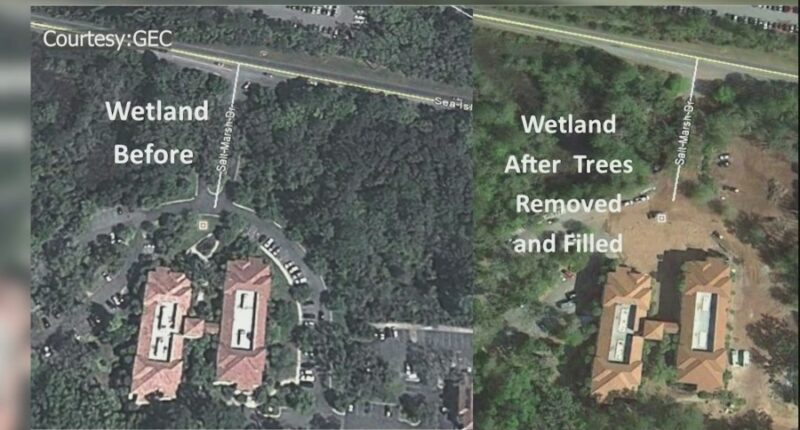Share this @internewscast.com

GLYNN COUNTY, Ga. () – Environmental organizations in Glynn County assert that a developer unlawfully filled wetlands on St. Simons Island. After two dismissals by the courts, they are striving to have the case reconsidered.
“They initiated the lawsuit in 2019, claiming that the Sea Island company breached the Clean Water Act by filling a half-acre wetland on their premises with a permit they acquired deceitfully,” stated Laura Heusel, an Attorney at Butler-Snow. “When applying for the permit, they informed the [U.S. Army] Corps of Engineers of their plans to fill the wetland for constructing a commercial office building. However, they instead used landscaping and sodding to fill it.”
The lawsuit was filed by the Glynn Environmental Coalition, Center for a Sustainable Coast, and St. Simons Island resident Jane Frazer.
“The Clean Water Act prohibits the discharge of pollutants, which includes sodding or any filler material placed in a wetland,” Heusel noted.
Last week, the plaintiffs filed a petition for a rehearing to the Eleventh Circuit court.
However, the courts have ruled in favor of Sea Island Acquisition twice already.
First, a lower court ruled the plaintiffs did not have standing to bring the case and couldn’t prove environmental harm.
For a second time, a district court along with the Eleventh Circuit federal court ruled that the St. Simon’s wetland did not meet the criteria of a jurisdictional wetland following a 2023 Supreme Court ruling.
“In the Supreme Court case of Sackett v. EPA, the U.S. Supreme Court refined the definition of a jurisdictional water of the U.S,” Heusel explained. “This now requires a continuous surface connection, and based on our lawsuit, we maintain that Sea Island company’s wetland had such a connection via a salt marsh to Dunbar Creek.”
Heusel emphasized that although the St. Simon’s wetland may not be restored to its pre-disturbance condition, environmentalists are concerned about the precedent that might be established by this case.
“The 11th Circuit makes the test for jurisdictional water under Sackett even more narrow, which could affect the jurisdictional status of other water bodies, especially in coastal systems.”
The Eleventh Circuit is yet to rule if it will grant a rehearing.










